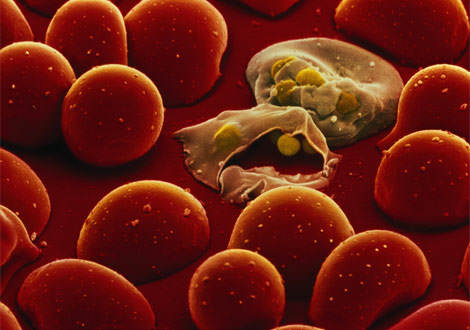The Bigger Problem- Malaria Resistance
- font size decrease font size increase font size
 Up to 1945, about 178 nations had endemic malaria. Since then 79 countries have eradicated the disease, including: UK in 1952; USA in 1952; Australia in 1970; Morocco in 2005; and Turkmenistan in 2010.
Up to 1945, about 178 nations had endemic malaria. Since then 79 countries have eradicated the disease, including: UK in 1952; USA in 1952; Australia in 1970; Morocco in 2005; and Turkmenistan in 2010.
Malaria is still endemic in 99 nations. 32 of them are expected to become controlled low-endemic countries with the aim of eventual elimination, while 67 are controlling the disease.
However, drug resistance threatens to reverse(erase) the progress made. Resistance was first noted in the early 1960’s in SE Asia & S.America within years of introduction of Chloroquine. In India, Chloroquine resistance first reported from Assam – 1973; Quinine Resistance - Brazil ( 1910); Proguanil -- Malaya ( 1949 ); Pyrimethamine -- Venezuela ( 1962 ); Mepacrine - Thailand ( 1980 ); Sulphadoxine and Pyrimethamine-- SE Asia,Thailand, S.America & S.Africa ( 1980 ); Mefloquine -- Thai, Cambodia, Myanmar( 1988 )
If drug-resistant malaria parasite spread and development is not halted, there is a serious risk of significantly undermining the efficacy of current treatments for the disease.
What is Drug Resistance?
The ability of a parasite strain to survive and/or multiply despite administration & absorption of a drug given in doses equal to or higher than those usually recommended but within the limit of tolerance of the subject.
Mechanism of resistance
Aminoquinolones, Biguanides & Sulfonamides
A. Multiple unlinked mutations encoding for Multidrug Resistance - pump which produces
i) active efflux of the drug or
ii) increased synthesis of a different haem-polymerase enzyme in the parasite, protecting the parasite from toxic Hb degradation
B. Role of chloroquine resistant gene (within 200 KB segment of chromosome 7 of PF)
1. point mutation in DHER gene which reduces the affinity of the enzyme complex of the drug.
2. Use of alternative enzymatic pathway by the parasite
3. PV is intrinsically insensitive
4. Failure to convert Proquanil to active metabolite: Genetic Polymorphism
Grading of Resistance
Sensitive (S)
Clearance of parasitaemia within 7 days without recrudescence
Low Grade Resistance (R1)
Clearance of parasitaemia followed by recrudescence (28 Days after the last dose)
High Grade ( RII)
Greater than 75% but less than 100% of parasites cleared within 7 days
High Grade ( RIII)
Parasite count does not fall by more than 75%
Currently artemisinin-based combination therapies are the most powerful weapons in treating falciparum malaria.
If ACTs lose their effectiveness, WHO fears that the number of malaria-related fatalities would increase considerably. Therefore, an action place was put in place to ensure this never happens.
The five-step action plan meant to stem the spread of artemisinin resistance is:
-
Halt the resistant-parasite spread - The Global Malaria Action Plan outlines a fully-funded malaria control strategy which should address the spread and development of artemisinin resistance. Nevertheless, further funding will be required to make sure the resistant parasite does not make headway in areas where it has emerged.
-
Better monitoring and surveillance for artemisinin resistance - Of the 75 countries that should have been carrying out routine testing of the efficacy of ACTs in 2010, only 31 did so, according to WHO. If the number of countries is not increased considerably there is a serious risk that the resistant parasite spreads and develops surreptitiously.
- More accurate diagnosis of malaria - ACTs are often misused for treating non-malaria fever. Using ACTs for patients without malaria contributes to resistance risk. WHO says all suspected malaria patients should undergo diagnostic testing before treatment is administered. This means access to malaria diagnostic testing must be improved.
-
More research into detecting resistant parasites - We need to develop faster techniques for detecting resistant parasites. New medications which can eventually replace ACTs should also be researched more thoroughly. In order to do this, more investment into research should become a top priority.
-
Motivate action and mobilize resources - Only with a well-coordinated and properly funded response from several stakeholders at national, regional and global levels, will the global plan have any chance of success.
Malaria is not just a problem of the tropics, it is worldwide. No country can achieve malaria elimination on its own, even if it is completely surrounded by sea. The mosquito and parasite do not respect borders.
